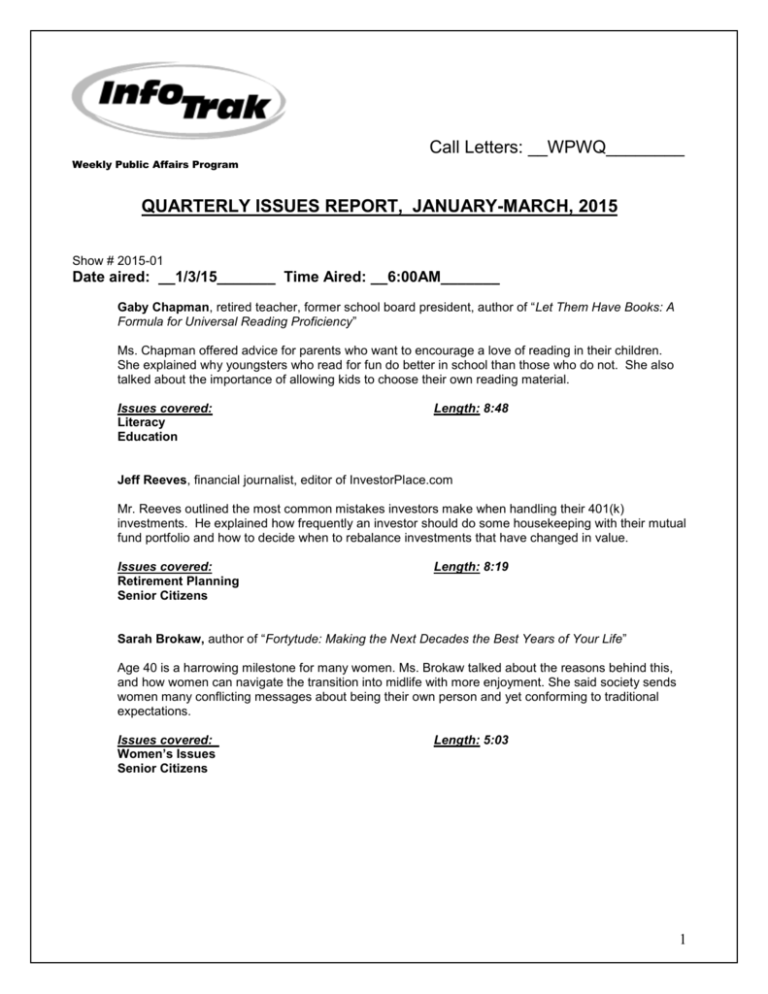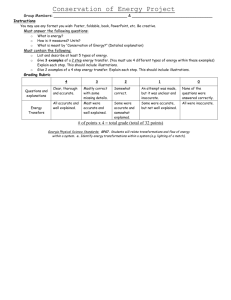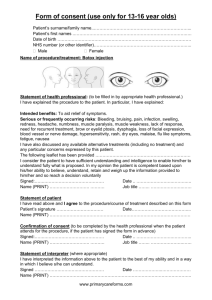
Call Letters: __WPWQ________
Weekly Public Affairs Program
QUARTERLY ISSUES REPORT, JANUARY-MARCH, 2015
Show # 2015-01
Date aired: __1/3/15_______ Time Aired: __6:00AM_______
Gaby Chapman, retired teacher, former school board president, author of “Let Them Have Books: A
Formula for Universal Reading Proficiency”
Ms. Chapman offered advice for parents who want to encourage a love of reading in their children.
She explained why youngsters who read for fun do better in school than those who do not. She also
talked about the importance of allowing kids to choose their own reading material.
Issues covered:
Literacy
Education
Length: 8:48
Jeff Reeves, financial journalist, editor of InvestorPlace.com
Mr. Reeves outlined the most common mistakes investors make when handling their 401(k)
investments. He explained how frequently an investor should do some housekeeping with their mutual
fund portfolio and how to decide when to rebalance investments that have changed in value.
Issues covered:
Retirement Planning
Senior Citizens
Length: 8:19
Sarah Brokaw, author of “Fortytude: Making the Next Decades the Best Years of Your Life”
Age 40 is a harrowing milestone for many women. Ms. Brokaw talked about the reasons behind this,
and how women can navigate the transition into midlife with more enjoyment. She said society sends
women many conflicting messages about being their own person and yet conforming to traditional
expectations.
Issues covered:
Women’s Issues
Senior Citizens
Length: 5:03
1
Show # 2015-02
Date aired: _____1/10/15____ Time Aired: __6:00am_______
Edward M. Hallowell, MD, Child and Adult Psychiatrist who specializes in ADD and ADHD, author of
”Driven to Distraction at Work: How to Focus and Be More Productive”
Many people in the workplace feel increasingly overwhelmed by a mix of nonstop demands and
rapidly changing technology. Dr. Hallowell discussed the underlying reasons why people lose their
ability to focus at work. He said the most common distraction is caused by electronic screens of all
kinds. He offered suggestions on how to sustain a productive mental state at work.
Issues covered:
Mental Health
Career
Length: 7:22
Jill Weisenberger MS, RDN, CDE, Nutrition, Culinary & Diabetes Expert, Registered Dietitian,
Certified Diabetes Educator, author of “The Overworked Person's Guide to Better Nutrition”
Ms. Weisenberger offered practical steps to plan, cook and eat better for a healthier lifestyle. She
explained why meal planning is so important and why an organized kitchen is critical in that process.
She explained how to ease a family into a lower-sodium diet.
Issues covered:
Nutrition
Personal Health
Length: 7:44
Jacquelyn F. Gamino, PhD, Research Scientist and Assistant Research Professor at the Center for
BrainHealth at the University of Texas at Dallas
Growing up poor can affect a child's behavior and school performance. Dr. Gamino led a study that
determined that intervention programs can help bring low-income adolescents up to speed with their
more affluent peers. She explained how cognitive intervention could easily be integrated into a normal
school setting.
Issues covered:
Education
Poverty
Length: 4:51
Show # 2015-03
Date aired: _____1/17/15____ Time Aired: ____6:00am _____
Tony Lee, employment expert, publisher of CareerCast.com
CareerCast recently completed a study to determine the 10 most and least stressful careers. Mr. Lee
explained the factors that his organization used to measure the stress in various jobs. He also
discussed the growth potential of careers on the list and why stressful jobs can still be desirable for
some people.
Issues covered:
Career
Mental Health
Length: 7:22
2
Kevin Shird, former drug dealer and convict, President and Co-Founder of the Mario Do Right
Foundation, author of “Lessons of Redemption”
Mr. Shird shared his story of spending years as young drug-trafficker on the streets of Baltimore, and
his eventual arrest and incarceration. He explained how he turned his life around, now working as a
community leader, speaking to students about substance abuse prevention and helping children of
addicted parents.
Issues covered:
Substance Abuse
Crime
Minority Concerns
Length: 7:44
Sean Burch, multiple world record holder in extreme sports events, fitness and motivational expert,
author of “Hyperfitness: 12 Weeks to Conquering Your Inner Everest and Getting Into the Best Shape
of Your Life “
Mr. Burch shared the story of how he became the first solo climber of Mount Everest.
He talked about the importance of diet and fitness, and offered tips on how the average person can
lose weight and get into shape.
Issues covered:
Personal Health
Length: 4:58
Show # 2015-04
Date aired: ___1/24/15______ Time Aired: ___6:00am ______
Andrew D. Eschtruth, Associate Director for External Relations at the Center for Retirement
Research at Boston College, co-author of “Falling Short: The Coming Retirement Crisis and What to
Do About It”
Americans are not saving enough for retirement and most won’t have enough to maintain their
lifestyle, or retire when they want. Mr. Eschtruth explained the reasons behind the problem and what
the average consumer can do to better prepare for retirement. He also outlined changes needed in the
401k system that could help avert a crisis.
Issues covered:
Retirement
Government Policies
Personal Finance
Length: 10:54
Ellen Peters, PhD, Professor of Psychology and Director of the Behavioral Decision Making Initiative
at The Ohio State University”
Dr. Peters led a study that examined how people perceived their math abilities, then compared it to
their actual math skills. About one in five people who say they are bad at math in fact score in the top
half of those taking an objective test. But a third of people who say they are good at math actually
score in the bottom half. She explained why math perceptions matter in everyday life and why it is
important for parents to encourage their children’s enjoyment of math.
Issues covered:
Education
Personal Finance
Length: 6:27
3
Les Bernal, Executive Director of Stop Predatory Gambling, a national grassroots citizen's
movement concerned about predatory gambling
Americans in dozens of states can now buy lottery tickets in a growing number of ways. Mr. Bernal
talked about the increasingly aggressive ways that governments are marketing new lottery products,
and how the targets are typically lower income citizens. He believes that governments have created a
mindset that discourages saving and personal responsibility and promotes state-sponsored wagering.
Issues covered:
Gambling Addiction
Government Policies
Length: 5:07
Show # 2015-05
Date aired: __1/31/15_______ Time Aired: _6:00am ________
Cathy Steinberg, personal safety expert and trainer, author of “The Fabulous Girl's Guide to Being
Fearless: What Every Girl Should Know”
FBI statistics say that 1 in 4 females in the US will be a victim of violent crime. Ms. Steinberg talked
about the most common types of violence directed at young women, and offered suggestions of how
to avoid dangerous situations. She explained why it is so important for prospective college students to
evaluate campus security before they make a decision on where to go to school.
Issues covered:
Sexual Assault
Crime
Women’s Issues
Length: 8:18
Chadwick Wasilenkoff, founder and CEO of Fortress Paper, a specialty paper company that
produces secure paper for currencies around the world
Mr. Wasilenkoff discussed the measures that governments take to prevent counterfeiting of
currencies. He said that a large percentage of counterfeit US bills are believed to be produced by
state-sponsored operations in countries such as North Korea. He explained why recent measures,
such as the improved $100 bill, do slow down counterfeiters temporarily. However, he said criminals
eventually adapt to such changes, so it is a never-ending battle. He explained how consumers can try
to identify counterfeit bills.
Issues covered:
Counterfeiting
Crime
Government Regulations
Length: 8:55
Megan Moreno, MD, researcher at Seattle Children's Research Institute and Associate Professor of
Pediatrics at the University of Washington
Dr. Moreno recently conducted a study that found that found that teens who smoke cigarettes are 23
times more likely to smoke marijuana, compared to those who don't use tobacco. She talked about the
reasons behind this finding. She also explained how the recent legalization of marijuana in several
states may affect its use nationwide.
Issues covered:
Substance abuse
Government Regulations
Length: 5:04
4
Show # 2015-06
Date aired: __2/7/15_______ Time Aired: ___6:00am ______
David Rabiner, PhD, Senior Research Scientist in the Department of Psychology & Neuroscience at
Duke University
The use of “study drugs”-- prescription medications used illegally by college students improve their
academic performance--is on the rise. Dr. Rabiner said the drugs of choice are those typically used to
treat ADHD. He discussed the question of whether the practice is a form of academic cheating. He
added that students who use these medications without a prescription typically have higher rates of
drug and alcohol abuse, perform worse academically and are more stressed out about their grades.
Issues covered:
Substance Abuse
Education
Length: 8:09
Michael Thompson, Director of the Council of State Governments Justice Center
Mr. Thompson’s organization conducted a study that examined whether juveniles who commit crimes
fare better if they are sentenced to community-based supervision or state-run incarceration. The study
found that youth who are locked up in state-run facilities are 21 percent more likely to be rearrested
than those who remain under supervision closer to home. He said that community supervision
programs are also far less expensive for taxpayers than state-secure facilities.
Issues covered:
Youth at Risk
Crime
Government Policies
Length: 8:55
Doug Goodman, PhD, MPA Director, Associate Professor of Public Affairs in the School of Economic,
Political, and Policy Sciences at The University of Texas at Dallas
Dr. Goodman co-authored a study that found that family-friendly employment policies tend to increase
productivity of employees in public organizations. He said it appears that these policies reduce stress,
and increase job satisfaction and employee loyalty.
Issues covered:
Workplace Matters
Parenting
Length: 5:01
Show # 2015-07
Date aired: ____2/14/15_____ Time Aired: _____6:00am ____
Michael Moss, Pulitzer Prize-winning reporter for The New York Times, author of “Salt Sugar Fat:
How the Food Giants Hooked Us”
Every year, the average American eats thirty-three pounds of cheese, seventy pounds of sugar and
double the recommended amount of salt--most of it from processed foods. Mr. Moss said that the use
of salt, sugar and fat increases sales of processed foods, reduces manufacturing costs, and enables
these foods to sit in warehouses or on the grocery shelf for months. He offered suggestions for
consumers on how to read product labels.
Issues covered:
Personal Health
Consumer Matters
Length: 8:01
5
Debra Donston-Miller, editor and writer for InformationWeek.com, expert in social networking and
information technologies
Ms. Donston-Miller said social media has essentially become an online resume, and that job hunters
who do not use it are at a huge disadvantage. She discussed the most effective strategies for using
social media in job searches and networking with colleagues. She explained which social networks
are the most useful and why. She also recommended sharing content on social networks, such as
reports or videos, to demonstrate expertise and abilities.
Issues covered:
Employment
Workplace Matters
Length: 8:59
Tim Lohrentz, Program Manager of the Insight Center for Community Economic Development, a nonprofit organization that focuses on policies to build economic health in lower income communities
Mr. Lohrentz recently conducted a study of payday loans and their net impact on the US economy. He
found that the burden of repaying the high-interest loans results in $774 million in lost consumer
spending and 14,000 job losses annually. He outlined the alternatives to payday loans that are
available to low-income borrowers.
Issues covered:
Payday Loans
Poverty
Government Regulations
Length: 5:10
Show # 2015-08
Date aired: ____2/21/15_____ Time Aired: ___6:00am ______
Mark Underwood, PhD, neuroscience researcher, expert on brain aging and cognitive function,
President and co-founder of Wisconsin-based biotech company Quincy Bioscience
Dr. Underwood said most people start to experience mild memory loss by age 40. He explained the
relationship of early memory problems to advanced forms of dementia as people enter their 70s and
80s. He outlined basic steps to take to keep the brain active, which may prevent or slow cognitive
decline as a person ages.
Issues covered:
Personal Health
Senior Citizens
Length: 8:01
Patty Osterberg, Education & Outreach Director of Sustainable Electronics Recycling International,
an organization that sets standards for responsible electronics recycling
Ms. Osterberg discussed the most responsible ways to recycle unused mobile phones and other
electronic gadgets. Her organization certifies recyclers with the R2 standard, which verifies that
recycling companies perform their services in a responsible and ethical manner. She talked about the
environmental impact of throwing a phone in the trash.
Issues covered:
Recycling
Environment
Consumer Matters
Length: 8:59
6
Susan Carpenter, Program Manager of the Insight Center for Community Economic Development, a
non-profit organization that focuses on policies to build economic health in lower income communities
Ms. Carpenter spent two years and thousands of dollars transforming her California home into a test
case for sustainable living. She talked about some of the most cost-efficient ways to go “green,” along
with some of the less successful projects. She outlined the easiest ways the average person can
improve their environmental footprint.
Issues covered:
Environment
Consumer Matters
Length: 4:55
Show # 2015-09
Date aired: ___2/28/15______ Time Aired: _____6:00am ____
Catherine Collinson, President of the Transamerica Center for Retirement Studies, a non-profit
private foundation
Ms. Collinson talked about the option of “phased retirement,” in which an employee begins to gradually
put in shorter work weeks. She said the strategy permits workers to test out retirement to see if they
enjoy it and can afford it, and allows them to avoid tapping into Social Security or savings until truly
necessary. She said many employers welcome it, because it allows the senior employee to mentor
younger colleagues and the organization to retain institutional knowledge.
Issues covered:
Retirement
Career
Length: 8:42
Brian Wansink, PhD, behavior economist, food psychologist, John Dyson Professor
of Consumer Behavior at Cornell University, Director of the Cornell Food and Brand Lab, author of
“Slim By Design, Mindless Eating Solutions for Everyday Life”
Dr. Wansink discussed his research at Cornell, which examines how and why we make choices about
the food we eat. He said the way a kitchen or other living environment is set up can encourage weight
loss naturally. He outlined innovative but inexpensive steps restaurants, grocery stores and school
cafeterias can make to encourage healthier dining choices.
Issues covered:
Health and Nutrition
Consumer Matters
Length: 8:34
Cami Walker, author of “29 Gifts: How a Month of Giving Can Change Your Life”
At age thirty-five, Ms. Walker was diagnosed with multiple sclerosis. As she battled depression about
her illness, she received an uncommon prescription from an African medicine woman: Give to others
for 29 days. She shared her story of finding small ways to help others, and how it made a dramatic
difference in her own health and happiness.
Issues covered:
Charitable Contributions
Volunteerism
Mental Health
Length: 4:24
7
Show # 2015-10
Date aired: ____3/7/15_____ Time Aired: _____6:00am ____
Tony Robbins, motivational speaker, author of “Money, Master the Game: 7 Simple Steps to
Financial Freedom”
Mr. Robbins picked the brains of more than 50 of the world’s most successful investors and money
managers, and found dramatically different philosophies. He discussed lessons that anyone can use
to improve their personal finances. He also talked about his efforts to feed the hungry and his
personal reasons for being concerned about poverty and hunger in America.
Issues covered:
Personal Finance
Consumer Matters
Length: 8:23
Andrew Sperling, Director of Federal Advocacy, National Alliance on Mental Illness
Mr. Sperling discussed the cost of mental health treatment, and the options available to make
treatment more affordable. He explained how the Affordable Care Act has affected mental health and
substance abuse services. He outlined the most common forms of assistance provided to employees
by larger employers. He also talked about the most common forms of mental illness.
Issues covered:
Mental Health
Substance Abuse
Consumer Matters
Length: 8:42
Richard Lichenstein MD, Director of Pediatric Emergency Medicine Research at the University of
Maryland School of Medicine
Wearing earphones while walking, biking or driving can be much riskier than most people think. Dr.
Lichenstein recently conducted a study that found that headphone-related deaths have tripled in the
past several years. He explained who is most likely to become a victim and the reasons that this
behavior is so dangerous.
Issues covered:
Traffic Safety
Personal Health
Length: 4:55
Show # 2015-11
Date aired: ___3/14/15______ Time Aired: ____6:00am _____
Tony Wagner, EdD, First Innovation Education Fellow at the Technology and Entrepreneurship
Center at Harvard University, Co-Director of the Change Leadership Group at the Harvard Graduate
School of Education, author of “Creating Innovators: The Making of Young People Who Will Change
the World”
Dr. Wagner said that innovative thinking is today’s most essential real-world skill. He believes that for
the US to successfully compete in the global economy, America needs to make teaching innovation a
top priority in schools, at home and in business. He explained the steps that teachers and parents can
take to foster more creative problem-solving in youngsters.
Issues covered:
Education
Government Policies
Employment
Length: 9:28
8
Raymond Francis, MSc, health expert, author of “Never Be Sick Again”
Mr. Francis shared his personal story of facing a life-threatening condition at age 48, and how he
overcame it. He believes that nearly every disease or illness can be prevented or reversed. He talked
about the common denominator of all diseases and the six potential causes. He also offered
suggestions to improve health at any age.
Issues covered:
Nutrition and Health
Consumer Matters
Length: 7:45
Darrell W. Gurney, founder of CareerGuy.com, Certified Personnel Consultant, Certified Job &
Career Transition Coach, Certified Career Management Coach, and Licensed Spiritual, author of
“Never Apply for a Job Again: Break the Rules, Cut the Line, Beat the Rest”
Mr. Gurney talked about the critical importance of networking when searching for a job. He said the
latest online tools can help, but they are not as effective as meeting and being known by as many
people as possible within an industry. He offered advice to the long-term unemployed.
Issues covered:
Employment
Length: 5:03
Show # 2015-12
Date aired: ____3/21/15_____ Time Aired: ___6:00am ______
Peter A. Sacco, PhD, psychologist who specializes in addictions, author of “Right Now Enough Is
Enough”
Dr. Sacco discussed the biggest misconceptions about addictions and bad habits. He said
pornography and gambling are the least recognized addictions among Americans today. He noted
that addicts are frequently able to hide their behavior and lead seemingly normal lives. He also talked
about the most effective routes to recovery.
Issues covered:
Substance Abuse
Mental Health
Length: 8:04
Jeff Speck, AICP, City Planner and Architectural Designer who advocates for smart growth and
sustainable design, author of “Walkable City: How Downtown Can Save America, One Step at a Time”
In the typical American city, the car is still king. Mr. Speck said that downtown areas and local
economies can be dramatically improved by becoming pedestrian-friendly. He explained how simple
decisions have cascading effects, and how citizens can influence their elected representatives to
make wise choices for their communities.
Issues covered:
Urban Planning
Government Policies
Economy
Length: 9:14
9
John P. Thyfault, PhD, Professor of Nutrition and Exercise Physiology, Director of the Health Activity
Center at the University of Missouri
Statins, the most widely prescribed type of cholesterol-lowering drugs, have prevented millions of
heart attacks and saved countless lives. But Dr. Thyfault conducted a study that found that statins may
also counteract the benefits of exercise, the other tried-and-true way to boost cardiac health. He
explained why doctors usually prescribe drugs, rather than recommending exercise or dietary change.
He also talked about how much exercise can be effective for people dealing with high cholesterol.
Issues covered:
Personal Health
Length: 5:06
Show # 2015-13
Date aired: __3/28/15_______ Time Aired: ___6:00am ______
Bill Thornton, PhD, Professor of Psychology, University of Southern Maine
Dr. Thornton led a study that found that the mere presence of a smart phone, even if it is turned off,
can make it difficult to perform complex tasks. He explained the likely reasons that a phone can be so
distracting. He offered suggestions for parents who are concerned about phone usage affecting their
child’s schoolwork.
Issues covered:
Mental Health
Consumer Matters
Length: 7:27
Sharon Fowler, MPH, Adjunct Assistant Professor, University of Texas Health Science Center at San
Antonio
Ms. Fowler was the co-author of a study that found that diet soda consumption leads to expanding
waistlines. She found that older adults who drank two or more diet sodas a day had waist size
increases that were six times greater than those of people who didn’t drink diet soda. She discussed
the possible physiological reasons and offered suggestions for those trying to control calories.
Issues covered:
Personal Health
Senior Citizens
Consumer Matters
Length: 9:43
Regina Leeds, professional organizer, author of “The 8-Minute Organizer”
Nearly everyone can use some help in getting organized. Ms. Leeds talked about the reasons that
keeping order in our lives and possessions is so difficult. She offered small, step-by-step suggestions
on how determine goals to get organized, and how to create positive routines for the long-term.
Issues covered:
Consumer Matters
Mental Health
Length: 5:06
© 2015 Syndication Networks Corp. All Rights Reserved.
Affiliate Relations: 847-583-9000, ext. 203 email: info@syndication.net
10






